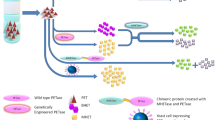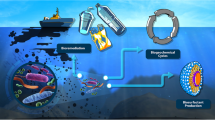Abstract
Objectives
With the view of designing a single biocatalyst for biorefining, carbazole dioxygenase was cloned from Pseudomonas sp. and expressed in Rhodococcus sp.
Results
The recombinant, IGTS8, degraded both carbazole and dibenzothiophene at 400 mg/l in 24 h. Maximum carbazole degradation was in 1:1 (v/v) hexadecane/aqueous phase. Anthracene, phenanthrene, pyrene, fluoranthene and fluorine were also degraded without affecting the aliphatic component.
Conclusions
Recombinant Rhodococcus sp. IGTS8 can function as a single biocatalyst for removing major contaminants of fossil fuels viz. dibenzothiophene, carbazole and polyaromatic compounds.



Similar content being viewed by others
References
Gaffney JS, Marley NA (2009) The impacts of combustion emission on air quality and climate-from coal to biofuels and beyond. Atmos Environ 43:23–36
Khan S, Adhikari DK, Gupta S, Gupta N (2015) High-level expression, purification and characterization of carbazole dioxygenase, a three components dioxygenase, of Pseudomonas GBS.5. Biotechnol Lett 37:1945–1952
Kilbane JJ II (2006) Microbial biocatalyst developments to upgrade fossil fuels. Curr Opin Biotechnol 17:305–314
Larentis AL, Sampaio C, Carneiro C, Martins B, Alves M (2011) Evaluation of growth, carbazole biodegradation and anthranilic acid production by Pseudomonas stutzeri. Braz J Chem Eng 28:34–44
Nojiri H (2012) Structural and molecular genetic analyses of the bacterial carbazole degradation. Biosci Biotechnol Biochem 76:1–18
Ramirez-Corridores MM, Borole AP (2007) Biocatalysis in oil refining. Elsevier, Amsterdam
Singh GB, Gupta S, Gupta N (2013) Carbazole degradation and biosurfactant production by newly isolated Pseudomonas sp. Strain GBS.5. Int Biodeterior Biodegrad 84:35–43
Song C, Ma X (2003) New design approaches to ultra-clean diesel fuels by deep desulfurization and deep dearomatization. Appl Catal B 41:207–238
Yu B, Ma C, Zhou W, Zhu S, Wang Y, Qu J, Li F, Xu P (2006) Simultaneous biodetoxification of s, n, and o pollutants by engineering of a carbazole-degrading gene cassette in a recombinant biocatalyst. Appl Environ Microbiol 72:7373–7376
Acknowledgements
We are thankful to Benjamin Stark for providing pRESX. We would also like to thank the Department of Science and Technology, Government of India, for their generous financial support (Project No. SB/YS/LS-223/2013) and Jaypee Institute of Information Technology for providing research fellowship (SK).
Author information
Authors and Affiliations
Corresponding author
Rights and permissions
About this article
Cite this article
Khan, S., Adhikari, D.K., Gupta, S. et al. Degradation of carbazole, dibenzothiophene and polyaromatic hydrocarbons by recombinant Rhodococcus sp.. Biotechnol Lett 39, 277–281 (2017). https://doi.org/10.1007/s10529-016-2242-9
Received:
Accepted:
Published:
Issue Date:
DOI: https://doi.org/10.1007/s10529-016-2242-9




